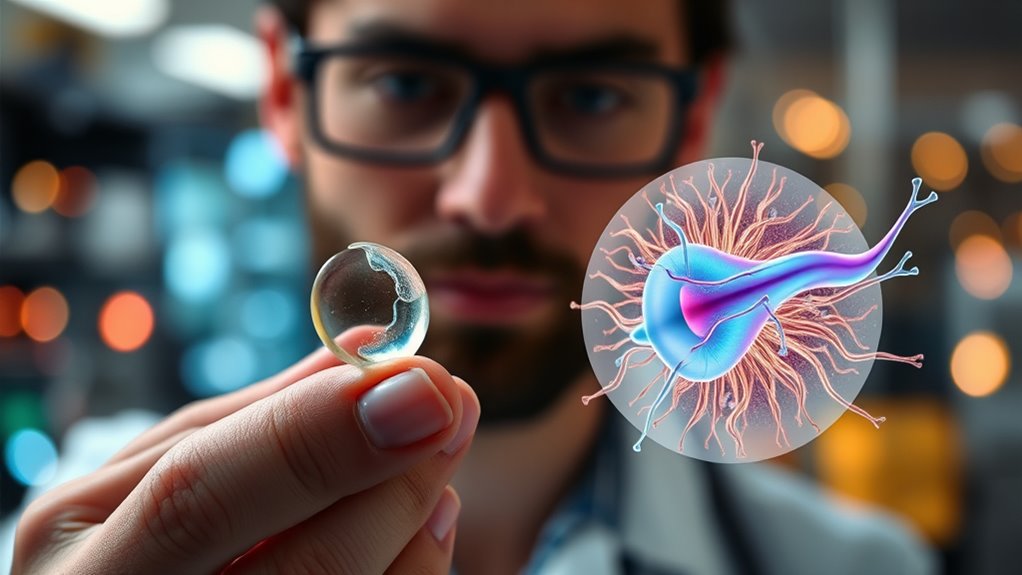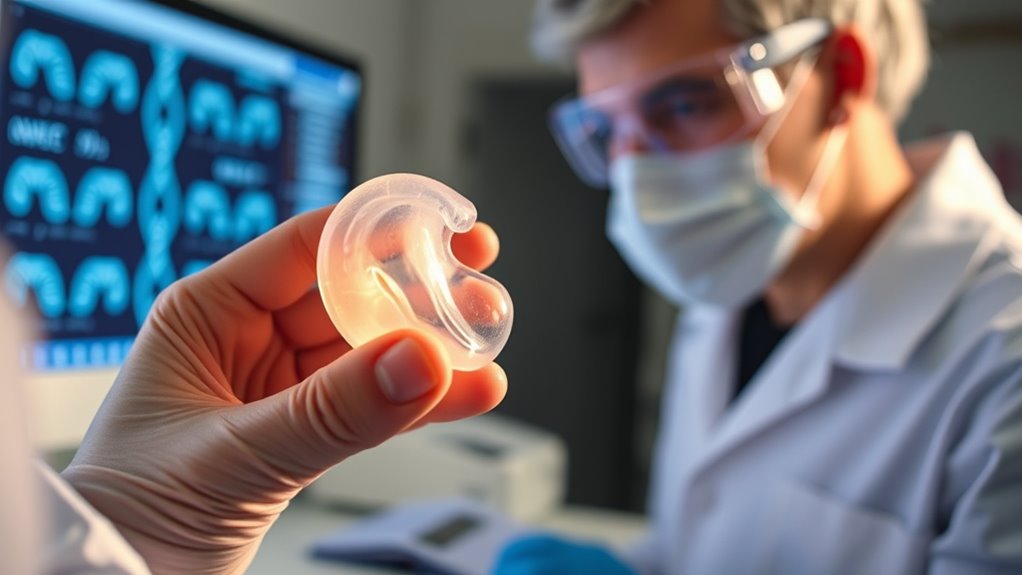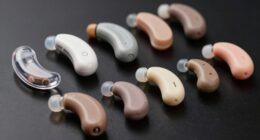Gene therapy is showing promising results in the fight against hearing loss by fixing or replacing faulty genes that cause damage. Advances in techniques like CRISPR help target specific genetic mutations, potentially restoring hearing function. Clinical trials are ongoing, offering new hope for effective treatments in the future. As research progresses, safer and more precise solutions are emerging. Stay with us to discover how these breakthroughs might change the way we treat hearing loss.
Key Takeaways
- Recent gene therapy trials show promising results in restoring hearing in humans by targeting genetic causes.
- Techniques like CRISPR edit faulty genes, promoting cochlear regeneration and repairing damaged auditory cells.
- Advances include safer, more efficient delivery methods, accelerating personalized treatment options for hearing loss.
- Combining gene therapy with traditional methods offers the potential for biological restoration of hearing.
- Ethical considerations and ongoing research ensure responsible development of gene-based therapies for hearing impairment.
Understanding the Roots of Hearing Impairment

Hearing impairment can stem from a variety of causes, and understanding these roots is essential for effective treatment. One major factor is genetic predisposition, where inherited genes increase your risk of hearing loss. If your family has a history of hearing problems, you might be more susceptible. Environmental influences also play a significant role; exposure to loud noises, ototoxic chemicals, or infections can damage your hearing over time. Sometimes, these factors combine, making it harder to determine the exact cause. Recognizing whether your hearing loss stems from genetics or environmental factors helps guide appropriate interventions. Additionally, awareness of risk factors can aid in early detection and prevention efforts. Understanding the causes of hearing loss and their origins can help in developing targeted therapies and protective strategies. For example, preventive measures such as hearing protection and avoiding harmful chemicals can make a difference. Being aware of genetic factors involved in hearing loss can also inform potential future treatments. Exploring genetic research in audiology continues to offer promising avenues for personalized medicine. By understanding the origins of your impairment, you can take targeted steps to protect and potentially improve your hearing health.
How Gene Therapy Works to Restore Hearing

Gene therapy offers a promising approach to restoring hearing by directly targeting the genetic causes of impairment. It works by delivering healthy copies of genes or editing faulty ones to fix genetic mutations that cause hearing loss. This process encourages cochlear regeneration, helping damaged cells recover and function properly. As ongoing research aims to ensure the trustworthiness of AI-driven diagnostics, safety and efficacy are carefully evaluated. Understanding the father-daughter bond can also inspire hope and resilience in medical breakthroughs, emphasizing the importance of support and innovation in overcoming challenges. Additionally, advancements in essential oil applications highlight the potential for supportive therapies in managing symptoms and improving quality of life during treatment. Incorporating voice-over techniques can also improve communication about these breakthroughs to broader audiences. The integration of modern medical technology further enhances the prospects of successful gene therapy interventions.
Promising Clinical Trials and Recent Breakthroughs

Recent clinical trials have brought encouraging evidence that gene therapy can effectively restore hearing in humans. Advances in gene editing techniques, such as CRISPR, are now being used to target specific genetic mutations responsible for hearing loss. Researchers are leveraging insights from auditory genetics to develop precise treatments that address the root causes rather than just symptoms. Recent breakthroughs include successful delivery of gene-editing tools directly into the inner ear, resulting in improved auditory function. These trials demonstrate that correcting genetic defects in vivo is not only feasible but promising for future therapies. Additionally, ongoing studies are exploring delivery methods to improve the efficiency and safety of gene therapies in the inner ear. As the field of AI-enhanced medical research advances, it may further accelerate the development of personalized treatments for hearing impairments. Furthermore, understanding the individual genetic profile of patients can help tailor therapies for better outcomes.
Challenges and Ethical Considerations in Gene Editing

While gene editing offers promising possibilities for restoring hearing, it also presents significant challenges and ethical dilemmas that must be addressed. You need to contemplate issues like genetic privacy, as sensitive genetic data can be vulnerable to misuse or discrimination. Ethical dilemmas also arise around consent, especially for edits that could affect future generations. Additionally, the potential for unintended genetic changes raises safety concerns. Furthermore, the use of Vetted – Global World materials and information is essential for ensuring responsible research practices. Risks of off-target effects and unpredictable outcomes can undermine public trust in gene therapy innovations. Ensuring informed consent and understanding long-term impacts is crucial for ethical implementation. Implementing safeguards and adhering to scientific guidelines can help address some of these ethical and safety issues effectively. Protecting individuals’ genetic privacy from misuse or exploitation remains a key concern as technology advances.
The Future of Hearing Loss Treatment and What’s Next

The future of hearing loss treatment looks promising as advancements in technology and medical research continue to evolve. You can expect improvements in hearing aid technology, making devices more discreet, smarter, and better at filtering background noise. Audiology diagnostics will become faster and more accurate, allowing for personalized treatment plans tailored to your specific needs. Researchers are exploring gene therapies alongside traditional methods, offering hope for restoring hearing at a biological level. Combining innovative diagnostics with cutting-edge devices, future treatments will likely be more effective and accessible. As these technologies develop, you’ll benefit from earlier detection, more natural hearing experiences, and less reliance on conventional hearing aids. The next decade promises a transformative era in tackling hearing loss. Additionally, ongoing research into automation in healthcare may further enhance the delivery of personalized treatments and improve patient outcomes. Advances in gene therapy also suggest that biological restoration of hearing could become a reality, reducing dependence on external devices. Furthermore, improvements in targeted drug delivery could enhance the effectiveness of biological treatments for hearing restoration. Moreover, private investment in innovative hearing technologies is increasing, accelerating research and development efforts. Emerging biotechnology approaches are also set to revolutionize the way hearing restoration is approached at a cellular level.
Frequently Asked Questions
Are Gene Therapy Treatments for Hearing Loss Widely Available Now?
Right now, gene therapy treatments for hearing loss aren’t widely available. While clinical trials are exploring these innovative options, treatment accessibility remains limited to participants in specific studies. You might not find these therapies in regular clinics yet. However, ongoing research offers hope for future widespread use. Keep an eye on advancements, as more trials could lead to broader treatment options, making this promising approach accessible to more people soon.
How Long Do the Effects of Gene Therapy Last?
You might wonder about the durability of results from gene therapy for hearing loss. While research shows promising long-term effects, it’s still early to determine exact long-term results. The durability of results can vary based on individual factors and treatment specifics. Ongoing studies aim to better understand the long-term effects and guarantee these therapies provide lasting improvements, giving you hope for sustained hearing restoration in the future.
What Are the Potential Risks Associated With Gene Editing for Hearing?
When considering gene editing for hearing, you should be aware of potential risks like ethical concerns and unintended mutations. These mutations could disrupt other genes or cause unforeseen health issues. Ethical questions also arise regarding consent and long-term impacts. While promising, gene editing isn’t risk-free, and careful evaluation is crucial to guarantee safety and address moral concerns before widespread use.
Can Gene Therapy Be Used for All Types of Hearing Loss?
Gene therapy can’t be used for all types of hearing loss due to its limitations. Hearing loss diversity means some cases, like age-related or sensorineural, may respond better than others. You should know that gene therapy mainly targets genetic causes, so it’s not a universal solution. While promising, current gene therapy limitations mean it’s still in development, and not all hearing loss types can benefit from this approach yet.
What Costs Are Expected for Future Gene Therapy Treatments?
You might wonder about the costs of future gene therapy treatments. Currently, cost estimation varies, but these therapies could be expensive initially, possibly reaching hundreds of thousands of dollars. Insurance coverage is still evolving, and it may not fully cover these innovative treatments yet. As research advances, costs are expected to decrease, making it more accessible, but you’ll want to stay informed about coverage options and financial assistance programs.
Conclusion
As you explore the potential of gene therapy for hearing loss, remember it’s like steering uncharted waters—full of promise but with challenges ahead. While breakthroughs bring hope, ethical questions and technical hurdles remain. Staying informed and involved can help shape a future where hearing impairments might be a thing of the past. With continued advances, you could witness a world where restoring hearing feels as natural as catching a gentle breeze—an inspiring horizon on the horizon.











